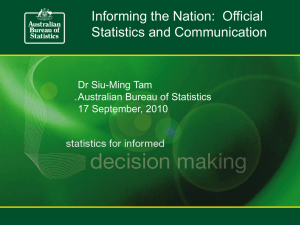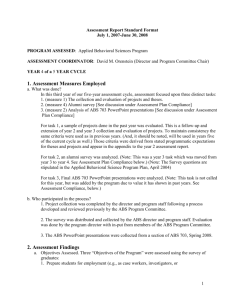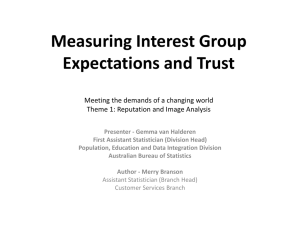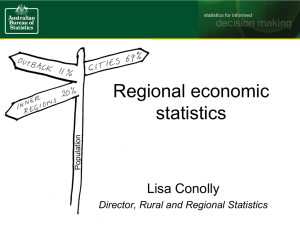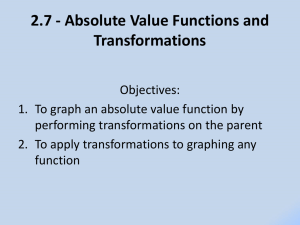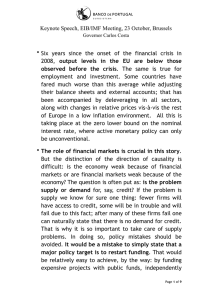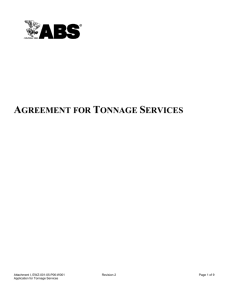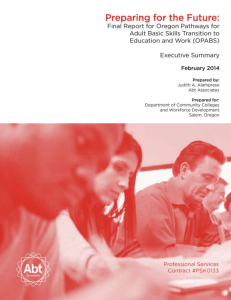Applied Behavioral Science (M.A.)
advertisement
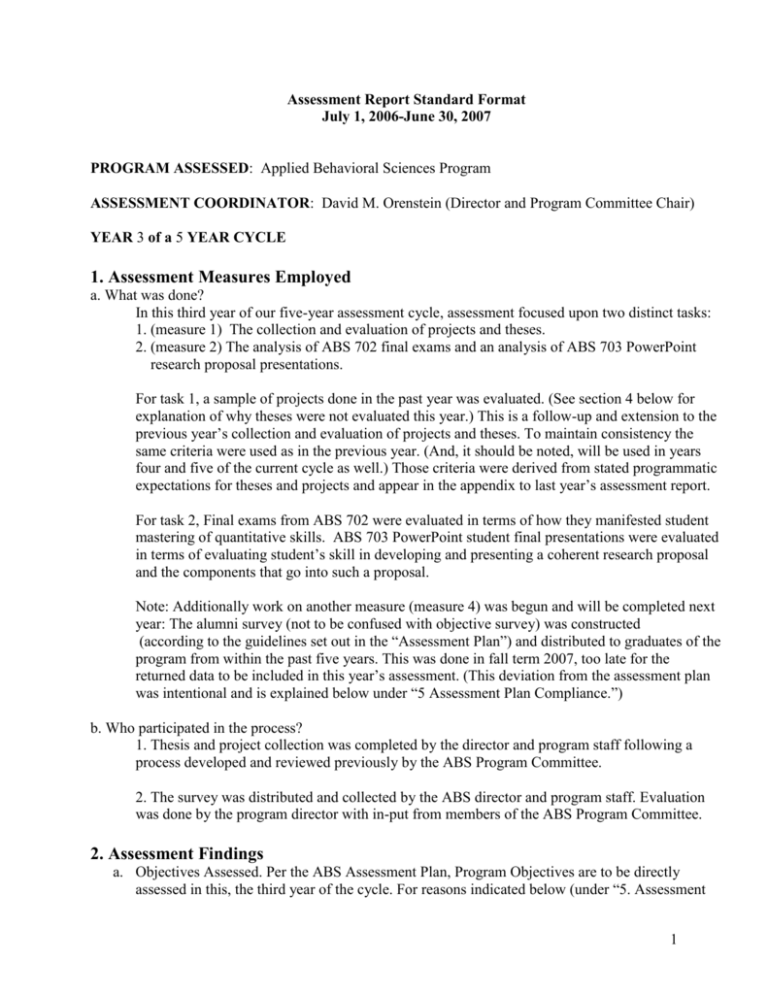
Assessment Report Standard Format July 1, 2006-June 30, 2007 PROGRAM ASSESSED: Applied Behavioral Sciences Program ASSESSMENT COORDINATOR: David M. Orenstein (Director and Program Committee Chair) YEAR 3 of a 5 YEAR CYCLE 1. Assessment Measures Employed a. What was done? In this third year of our five-year assessment cycle, assessment focused upon two distinct tasks: 1. (measure 1) The collection and evaluation of projects and theses. 2. (measure 2) The analysis of ABS 702 final exams and an analysis of ABS 703 PowerPoint research proposal presentations. For task 1, a sample of projects done in the past year was evaluated. (See section 4 below for explanation of why theses were not evaluated this year.) This is a follow-up and extension to the previous year’s collection and evaluation of projects and theses. To maintain consistency the same criteria were used as in the previous year. (And, it should be noted, will be used in years four and five of the current cycle as well.) Those criteria were derived from stated programmatic expectations for theses and projects and appear in the appendix to last year’s assessment report. For task 2, Final exams from ABS 702 were evaluated in terms of how they manifested student mastering of quantitative skills. ABS 703 PowerPoint student final presentations were evaluated in terms of evaluating student’s skill in developing and presenting a coherent research proposal and the components that go into such a proposal. Note: Additionally work on another measure (measure 4) was begun and will be completed next year: The alumni survey (not to be confused with objective survey) was constructed (according to the guidelines set out in the “Assessment Plan”) and distributed to graduates of the program from within the past five years. This was done in fall term 2007, too late for the returned data to be included in this year’s assessment. (This deviation from the assessment plan was intentional and is explained below under “5 Assessment Plan Compliance.”) b. Who participated in the process? 1. Thesis and project collection was completed by the director and program staff following a process developed and reviewed previously by the ABS Program Committee. 2. The survey was distributed and collected by the ABS director and program staff. Evaluation was done by the program director with in-put from members of the ABS Program Committee. 2. Assessment Findings a. Objectives Assessed. Per the ABS Assessment Plan, Program Objectives are to be directly assessed in this, the third year of the cycle. For reasons indicated below (under “5. Assessment 1 plan Compliance”) the evaluation of the “Alumni Survey” necessary for the assessment of objectives was moved to year four of the present cycle. Accordingly all program objectives will be assessed next year. b. Learning Outcomes Assessed this Year – b. - Students will master graduate level quantitative and qualitative skills as appropriate to the study of criminal justice. c. - Students will master formal graduate writing skills appropriate for the creation of graduate theses/projects and research articles. c. Findings b. - Students will master graduate level quantitative and qualitative skills as appropriate to the study of criminal justice. Measure 1 – Review of projects showed this goal was met. Students were able to make appropriate use of quantitative and qualitative methodologies. Measure 2Final exams from ABS 702 and PowerPoint presentations from ABS 703 indicate respectively the appropriate ability to calculate and interpret quantitative methodological conclusions and the appropriate ability to use and integrate qualitative and quantitative materials into the research process. c. - Students will master formal graduate writing skills appropriate for the creation of graduate theses/projects and research articles. Measure 1 - Review of projects show this goal was met. Most projects are written in the form of journal articles and demonstrate that students can write in a style and format appropriate for such articles. Measure 2 – Final exams from ABS 702 and PowerPoint presentations from ABS 703 indicate respectively the appropriate ability to write about research, its results and its significance. Explanation of project evaluation used in the evaluation of learning outcomes b and c. Evaluation of 8 randomly selected final projects dating from the current assessment year indicated substantial success in attainment of learning outcomes a and b. Some minor grammatical and spelling errors continue to be apparent and some labeling of charts and graphs appeared to slightly deviate from accepted guidelines. Results paralleled last years: No significant problems appeared in students’ ability to show use of quantitative or qualitative data in a manner generally acceptable in the social sciences, state a clear research question or hypothesis, and appropriately construct the general elements expected in work reporting on applied research (title, abstract, literature review, and implications of findings). Explanation of ABS 702 Final exams used in the evaluation of learning outcomes b and c. The final exams of all 22 students from winter ABS 702 were analyzed. Each student mastered in excess of 90% the quantitative material taught in the course in terms of calculation and interpretation. Additionally, student abilities to determine which statistic to use and selection of the appropriate test in SPSS exceeded 95%. Explanation of ABS 703 PowerPoint presentations used in the evaluation of learning outcomes b and c. 2 The PowerPoint presentation was formalized this year. Each student was given the same sixteen slide titles and guidelines for the material to be included. Students were evaluated on the ability to state the elements of appropriate research design, the application of that design to a particular coherent research question, and the overall clarity and integration of presentation. 3. Program Improvements Though the results of the data indicate that no significant program revisions were necessary it should be noted that the distribution and emphasis of Project Guidelines seems to have reduced anxiety of students as they approach their project. During its winter 2008 meeting The ABS Program will consider including a presentation and discussion of those guidelines as a regular feature of ABS 701 4. Assessment Plan Compliance For measure #1: Only projects were looked at this year due to an insufficient number of theses from which to draw a sample. This is the second year this has occurred. The ABS Program Committee will review suggesting an appropriate change in the ABS Assessment Plan. For measure #4: The “Objectives Survey” was not mailed out until fall 2007, too late to fully evaluate the results for this year. The delay in mailing out the survey was intentional. According to the ABS Assessment Plan the survey was to be sent to students who graduated within the last five years. By delaying the mailing we were able to capture a larger percentage of students who have gone through the program under more or less current requirements and current ways of teaching the core courses (both in terms of methods and content). Accordingly, the delay should result in a considerably more accurate measure of meeting objectives in the program as it is now structured. Evaluation will begin in winter 2008 and be completed by the end of spring 2009. 5. New Assessment Developments N/A 3
